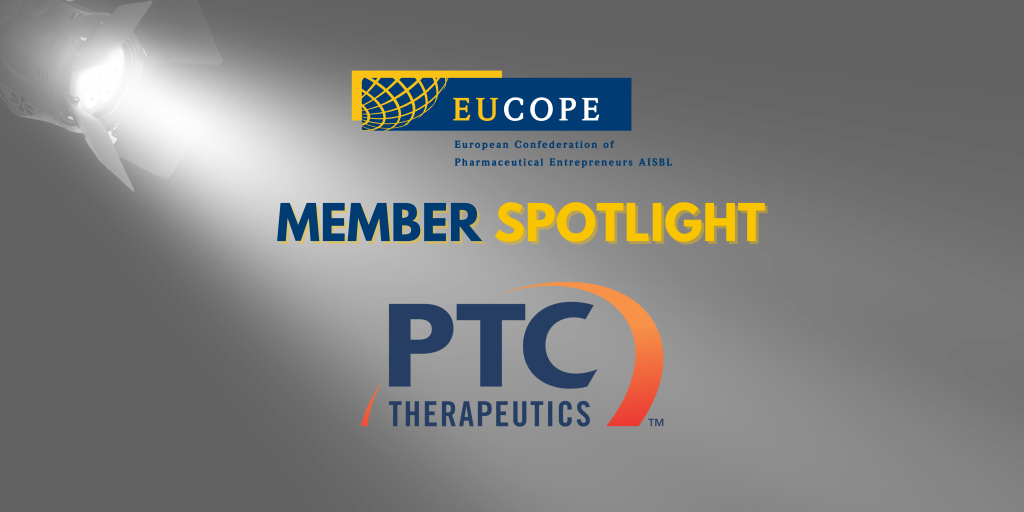Member Spotlight - October 27, 2022
EUCOPE Member Spotlight: Q&A with PTC Therapeutics
Every month, EUCOPE spotlights a member company and the great work they’re doing to advance the life sciences industry and drive innovation to serve patients better. In October, we spoke with Adrian Haigh, Senior Vice President and Head of International at PTC Therapeutics, Inc.

Adrian Haigh is currently Senior Vice President and Head of International at PTC Therapeutics, joining in July 2014. He is responsible for PTC’s commercial activities outside of North America. Prior to joining PTC Adrian held the position of Chief Operating Officer at Gentium. He built and managed the company’s commercial and medical affairs organization and was also responsible for business development, playing a pivotal role in the sale of Gentium to Jazz Pharma for $1billion. Prior to joining Gentium, Adrian served as Regional Vice President, Commercial Operations at Biogen Idec where he managed affiliates in Europe, Canada, Latin America and the global distributor business. From 2002 to 2007 he held leadership positions at Amgen, including General Manager of Portugal and Scandinavia and Head of the $1.5b International Oncology Franchise. His career also includes management positions with SmithKline Beecham, Schering-Plough, Organon and Novo-Nordisk. He holds a BA in Economic History from Huddersfield Polytechnic, England, a Diploma in Marketing from the Institute of Marketing and a Diploma in Company Direction from the Institute of Directors.
Tell us about your organisation and its mission and how you drive innovation internally?
Since 1998, PTC has been a biopharmaceutical company focused on innovative small molecule and gene therapies for rare genetic disorders. We operate offices and/or research labs in more than 20 countries and occupy a business footprint in more than 50 countries around the world.
PTC achieved historic breakthroughs in treating the rare disease Duchenne muscular dystrophy in 2003 and has continued to grow and evolve ever since. Through strategic acquisitions and unparalleled scientific research, our team of “brilliant minds” is “measured by moments” brought to patients and caregivers who face rare disease challenges like Duchenne, aromatic L-amino acid decarboxylase (AADC) deficiency, Huntington’s disease, spinal muscular atrophy and many more.
We are very proud that on 20 July this year, Upstaza™ (eladocagene exuparvovec) was granted marketing authorization by the European Commission. Upstaza is the first approved disease-modifying treatment for aromatic L-amino acid decarboxylase (AADC) deficiency and the first marketed gene therapy directly infused into the brain. It is approved for patients 18 months and older.
How do your organisation’s activities help patients now and into the future?
At PTC, we dedicate ourselves to using ground-breaking science as we discover and develop treatments for patients living with rare disorders. We believe by using the newest technologies available, we can find innovative ways to treat these diseases which can allow patients to have shared moments with their families.
By using the newest technologies available, it is possible to discover innovative ways to treat rare diseases, which can provide life-changing and transformative treatments for patients around the world. We believe in improving patient outcomes through collaboration and partnership.
PTC is proud to work closely with medical providers and health care professionals around the world, and to provide support through programs that help address unmet medical needs in our areas of therapeutic focus. One of the core aspects of our approach to corporate social responsibility is to foster patient access to innovative rare and life-threatening disease treatments. Access to therapy is achieved by scientists and providers working in concert to facilitate effective disease treatment protocol.
What do you see as the biggest challenge facing the life sciences industry today?
As a company developing therapies (including ATMPs) for rare conditions, PTC is seeking to raise awareness of the inherent access challenges that these treatments face. An increasing number of ATMPs are being developed for rare and very rare conditions, and it is critical that the approval, access and delivery systems evolved so that the potential of these innovative and transformative treatments can be harnessed for patients.
Working together with biopharmaceutical companies, regulators, payers, HTA bodies and policy makers, we have an opportunity to forge new ground so patients, caregivers and health systems can realize the full benefit of medical innovation. We are at the frontier of an exciting therapy pipeline. If we get it right for rare diseases, gene therapies for more common conditions may follow in the future, so the gains are amplified many times over. There are many challenges we need to address but amongst them, the following three are key in my opinion:
Speed up diagnosis of rare disease: Getting the right diagnosis for a rare disease can be notoriously difficult. We often hear of families who have visited an endless number of specialists over years to find out why their child is not meeting expected developmental milestones.
Adapt market access processes: Regulatory and HTA frameworks were set up for the well-known therapy model, where a treatment is given and paid for across a lifetime and, often to large numbers of patients (for example, diabetes). Gene therapies do not fit this model. Typically given only once, payment is upfront, for a value that stretches over a lifetime. Our pricing and reimbursement process needs adaptation.
Harmonize and simplify the collection of real-world evidence: There needs to be more significance given to data collected through close patient follow-up in disease registries that build up vital long-term safety and efficacy data. And the process for gathering this data needs to be more consistent, coordinated, and efficient.
With very small patient populations, real-world evidence that is gathered after a product has been approved for use in Europe is important to understand the long-term benefit of the treatment and the impact on the patient’s quality of life. It is critical to help smooth the path to patient access.
What are the major health policy issues and themes that you are most focused on in 2022?
We are living in very ‘exciting’ times. Apart from the national pricing and reimbursement, and access discussions, we are very focussed on joining the industry’s efforts to ensure that the various EU legislative and policy discussions do not harm Europe as a place where innovation can be brought to patients and where biopharmaceutical companies can be created and flourish. Regarding the three key pieces of legislation, we believe it is important that:
The implementation of the EU HTA Regulation ensures that the methodologies which are being developed for the joint clinical assessments are suitable for orphan medicines and ATMPs and that duplication with national HTA procedures are as much as possible, avoided.
The review of the Orphan Medicines Regulation does recognise that 95% of all rare diseases still not have a treatment. Therefore, the EU must continue to stimulate both industry and other stakeholders to further advance science to come up with treatments for the people suffering from these rare diseases.
The review of the EU pharmaceutical legislation leads to an EU regulatory system fit for purpose and ready for the new technologies and therapies. It does not introduce new elements such as mandatory launch obligations which are neither suitable for medicines such as orphan medicines or ATMPs, nor implementable for mid-size companies like PTC and does not decrease incentives and IP protection periods, which would make Europe a less attractive area for innovation.
What attracted you to join EUCOPE and how can we help you achieve your business goals?
We have been a member of EUCOPE for a long time and really feel at home. It is the organisation which represents companies like PTC – relentlessly innovative, typically smaller in size and focused on developing therapies for people with rare diseases. There are many important legislative and policy discussions going on which will shape the healthcare sector in general and the biopharmaceutical industry, in particular for, years to come. EUCOPE ensures very effectively that the voices, opinions and expertise of PTC and others are heard.
For more information about EUCOPE membership
Visit our Benefits of Membership Page, or schedule an introductory call with our Business Development Manager Dante Di Iulio diiulio@eucope.org

